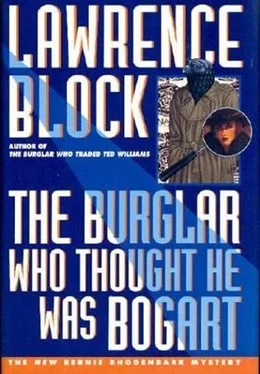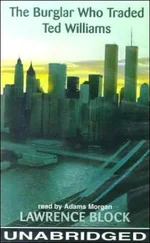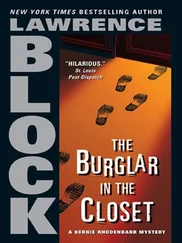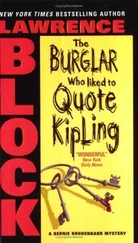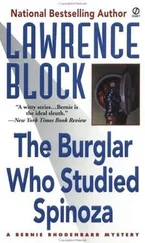On the other hand, if I’d passed his photograph without the barest twinge of recognition, I would never have known who he was. Or, come to think of it, cared.
So if anything was remarkable (and it certainly seemed as though something ought to be) it was that I had subconsciously retained the image of Vlados in my mind from an earlier glance through the Scott catalog. But that, damn it to hell, wasn’t remarkable either, because I’d looked up Anatruria in that very volume a week or so ago, after Ilona had acknowledged it as her birthplace. That was why I’d been able to rattle off all that historical data so glibly, impressing the daylights out of Carolyn.
I used the magnifying glass and had another look at His Highness. He was better, I decided, at flashing smiles than at looking solemn. The smile might not have been appropriate for a serious philatelic occasion like this, but it gave him a leg up on the legion of royal twits who’ve left their faces on the stamps and coins of Europe. I wondered what might have been the source of his claim to the Anatrurian throne, and if he was related to the other kings and princelings. Most of them are descended one way or another from Queen Victoria, and are almost as much fun at parties as she was.
What about Vlados’s consort, she of the high-piled hair and the pathetic little foxes? The Scott people hadn’t provided a picture of her, but they were nice enough to tell me her name. According to the descriptive listing, she appeared twice in the series-alone on the 35-tschirin stamp, and with her husband on the 50-tschirin denomination. And her name was Queen Liliana.
Scott’s hadn’t priced the Anatrurian issues, noting at once that they were very rare and of dubious philatelic legitimacy; they had been printed to carry not the mail but a message, and, while postally used copies did in fact exist, these seemed to represent contrived cancellations affixed by postmasters sympathetic to the cause of Anatrurian independence.
So Scott knew they were valuable, but didn’t want to go on record with a price. There weren’t many specimens up for grabs, and then again there weren’t all that many hands out there grabbing. If the stamp collection I knocked over happened to contain a set of these gummed portraits of good King Vladdy, I could figure out how to unload them. It would take a little research-specialized catalogs, auction records, some library time spent closeted with back issues of Linn’s. I might not net as high a percentage of retail value as I would with more popular material, but I wouldn’t have any real trouble getting a decent price.
But that wasn’t my problem, because I didn’t have the stamps. I had an Anatrurian girlfriend, but Anatruria was out of business as a stamp-issuing enterprise half a century before she was born, and she might not even know her country had a postal history.
Might that not be something for us to talk about? I could lift the photo from its hallowed place on her footlocker and say, “Ah, King Vlados, and his lovely Queen Liliana! I’d recognize them anywhere.” Would that impress her? Would she be dazzled by my familiarity with her nation’s history, touched by my interest in her heritage?
Maybe. Or maybe she’d just raise her eyebrows the slightest bit and give me that look of skeptical amusement.
I reached for the phone and dialed her number again, with no more success than the other times I’d tried.
Then the little guy came in and stuck a gun in my face.
When I first saw him on his way through the door I thought he was a kid wearing his father’s clothes. He couldn’t have been more than five-three, and judging by the way he walked he already had lifts in his shoes. He had a very narrow face, as if it had gotten in the way when Mother Nature clapped her hands. His nose was long and narrow, his lips thin. His hair and eyebrows were black and his skin was very pale, almost translucent. There were patches of color on his cheeks, but they were more suggestive of consumption than radiant good health.
He was wearing a lime-green sport shirt with flowing collar points and he’d buttoned it all the way up to the neck. His pants were of high-gloss blue gabardine, and his shoes were wing-tip slip-ons of woven brown leather. He was wearing a hat, too, a straw panama with a feather in its band, and I think it must have been the hat that made him look like an overdressed child. It was the crowning touch, all right.
“Name your price,” he said.
I didn’t hesitate. “I’m sorry,” I said, “but I’m afraid it’s not for sale.”
The first thing I thought-the only thing I thought-was that he was looking to buy my store. I didn’t delude myself that he’d made a study of Barnegat Books and concluded that it was a gold mine. On the contrary, I figured he saw it as the commercial real estate equivalent of a teardown; he’d buy me out so that he could take over my lease, sell my whole stock en bloc to Argosy or the Strand, and establish in Barnegat’s stead a Thai restaurant or a Korean nail shop, something that would be a great cultural asset to the neighborhood. I get offers like that all the time, strange as it may seem, and I don’t bother explaining that I own the building, and that consequently I’m the landlord as well as the tenant. For one thing, that part’s a secret; for another, it would simply invite further inquiry. I just tell them all the business is not for sale, and sooner or later they believe me and go away.
But not this fellow. Damned if he didn’t reach into his pocket and come out with a gun.
It was a very small gun, a flat nickel-plated automatic with pearl grips, small enough to carry in his pants pocket, small enough to fit in his very small hand. I don’t know what caliber bullet it held-.22 or.25, I suppose-but either one will kill you if it hits you in the right place, and he was right across the counter from me, close enough to put a bullet wherever he wanted it.
If I’d thought it over I’d have been terrified. He was just the right size to be one of those sawed-off psychopaths you used to see on the screen all the time, those little reptilian hit men who seem to kill without hesitation, and certainly without any change of expression. And here he was in my store and pointing a gun at me.
“You idiot!” I snapped. “What the hell’s the matter with you? Put that away this minute.”
Well, see, it looked like a toy. Like a cap gun, say, or like a cunningly disguised cigarette lighter. I’m not saying that’s what I thought it was, I knew it was a real gun, but I can’t think of anything else that would explain my reaction. Instead of reacting sensibly in fear and trembling, I was pissed off. Where did this, this kid, get off coming into my store and waving a gun around? And didn’t the little punk need a stern talking-to?
“Right this minute!” I said when he hesitated. “Don’t you realize you could get in trouble with that thing? Do you know what time it is?”
“Time?”
“It’s four-thirty,” I said. “And there’s a policeman who’s due here any minute, and how would you feel standing there with that thing in your hand and having a cop walk in on you? How’d you like to try explaining that?”
“But-”
“God damn it, put it away!”
And damned if he didn’t do just that. “I…I am sorry,” he said, the spots of color on his cheeks darkening even as the rest of him seemed to grow paler still. He glanced at the gun as if it were something shameful, hiding it in his hand as he lowered it and tucked it back where it had come from. “I did not mean…I would not wish…I deeply regret…”
“That’s better,” I said graciously. “Much better. Now tell me what I can do for you. Is there a book you’re looking for?”
Читать дальше
